
Cold as it may be outside, for Chinese netizens, November represents the country’s most heated online event, Singles’ Day. It is a shopping holiday popular among young Chinese citizens that celebrates their pride in being single. The date, November 11th, was chosen because the number “1” represents an individual; thus, this online festival is also known as the Double Eleven Festival in China.
Though the holiday has become the largest offline and online shopping festival in the world, it is the latter that attracts global attention. In 2018, Alibaba, China’s leading online shopping platform, set a sales record of 213.5 billion yuan ($30.8 billion) on Double Eleven. The event got off to a strong start with sales hitting $1 billion in one minute and 25 seconds, while its rival, JD.com, sold goods worth 159.8 billion yuan ($23 billion) during its Singles’ Day campaign.
As the online shopping festival has become an integral part of China’s economy and internet culture, many people have joined us to share their experiences of Double Eleven. They may be a Chinese national living abroad, who thinks the online event is a way to regain her connection with her homeland, or a Russian online seller, who believes shopping festival provide him an opportunity to promote Chinese culture to the world, or a British rookie who is excited to experience her first Double Eleven. Follow us to learn their stories, and have fun during the upcoming Double Eleven Festival!
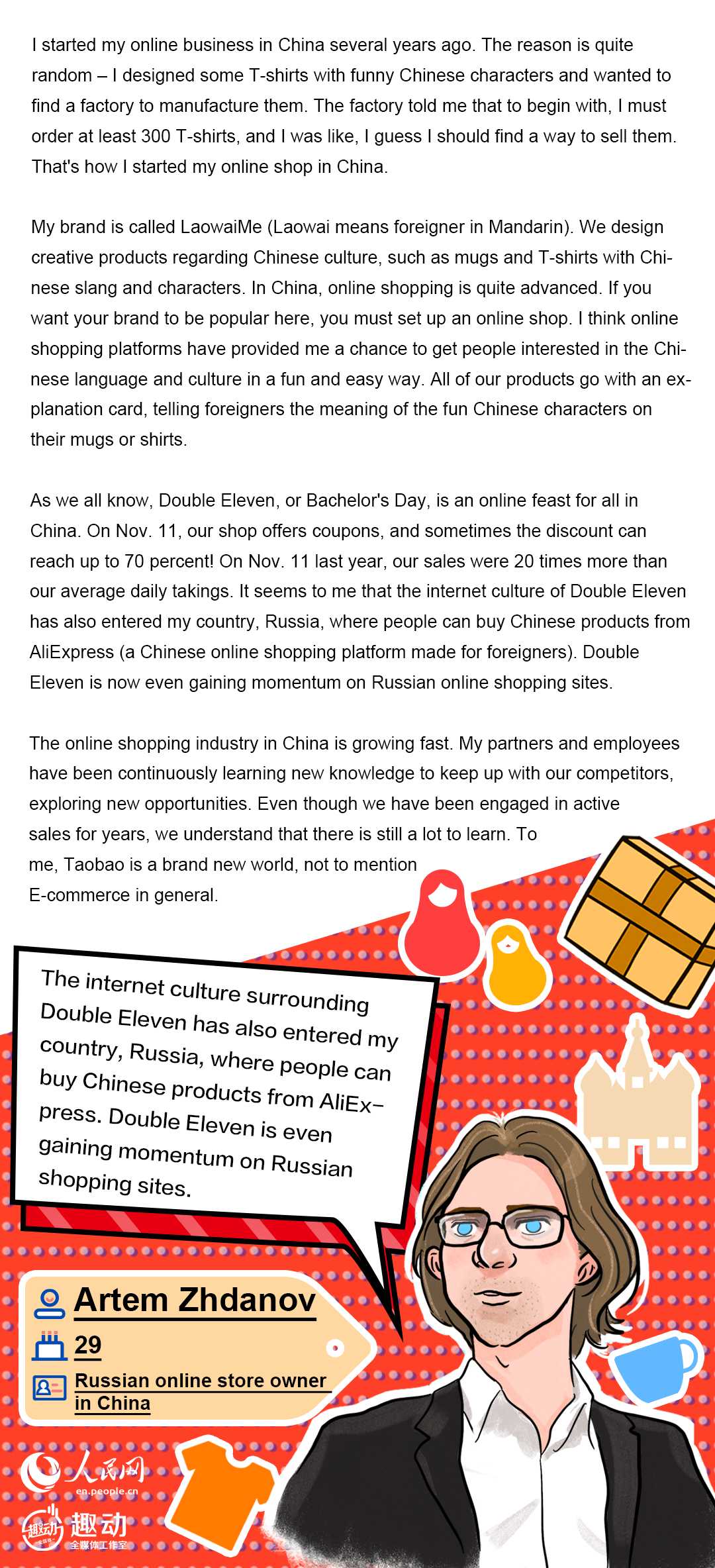
Artem Zhdanov, 29
Shanghai
Online store owner in China, experienced online seller
I started my online business in China several years ago. The reason is quite random – I designed some T-shirts with funny Chinese characters and wanted to find a factory to manufacture them. The factory told me that to begin with, I must order at least 300 T-shirts, and I was like, I guess I should find a way to sell them. That's how I started my online shop in China.
My brand is called LaowaiMe (Laowai means foreigner in Mandarin). We design creative products using Chinese culture, such as mugs, T-shirts and other products with Chinese slang and characters. In China, online shopping is quite advanced. If you want your brand to be popular here, you must set up an online shop. Online shopping platforms have provided me a chance to get people interested in the Chinese language and culture in a fun and easy way. All of our products go with an explanation card, telling foreigners the meaning of the fun Chinese characters on their mugs or shirts.
As we all know, Double Eleven, or Bachelor's Day, is an online feast for all in China. On Nov. 11, our shop offers coupons, with discounts of up to 70 percent! On Nov. 11 last year, our sales were 20 times more than our average daily takings. It seems to me that the internet culture of Double Eleven has also entered my country, Russia, where people can buy Chinese products from AliExpress (a Chinese online shopping platform made for foreigners). Double Eleven is now even gaining momentum on Russian shopping sites.
The online shopping industry in China is growing fast. My partners and employees have constantly been learning to keep up with our competitors, exploring new opportunities. Even though we have been engaged in active sales for years, we understand that there is still a lot to learn. To me, Taobao is a brand new world, not to mention E-commerce in general.
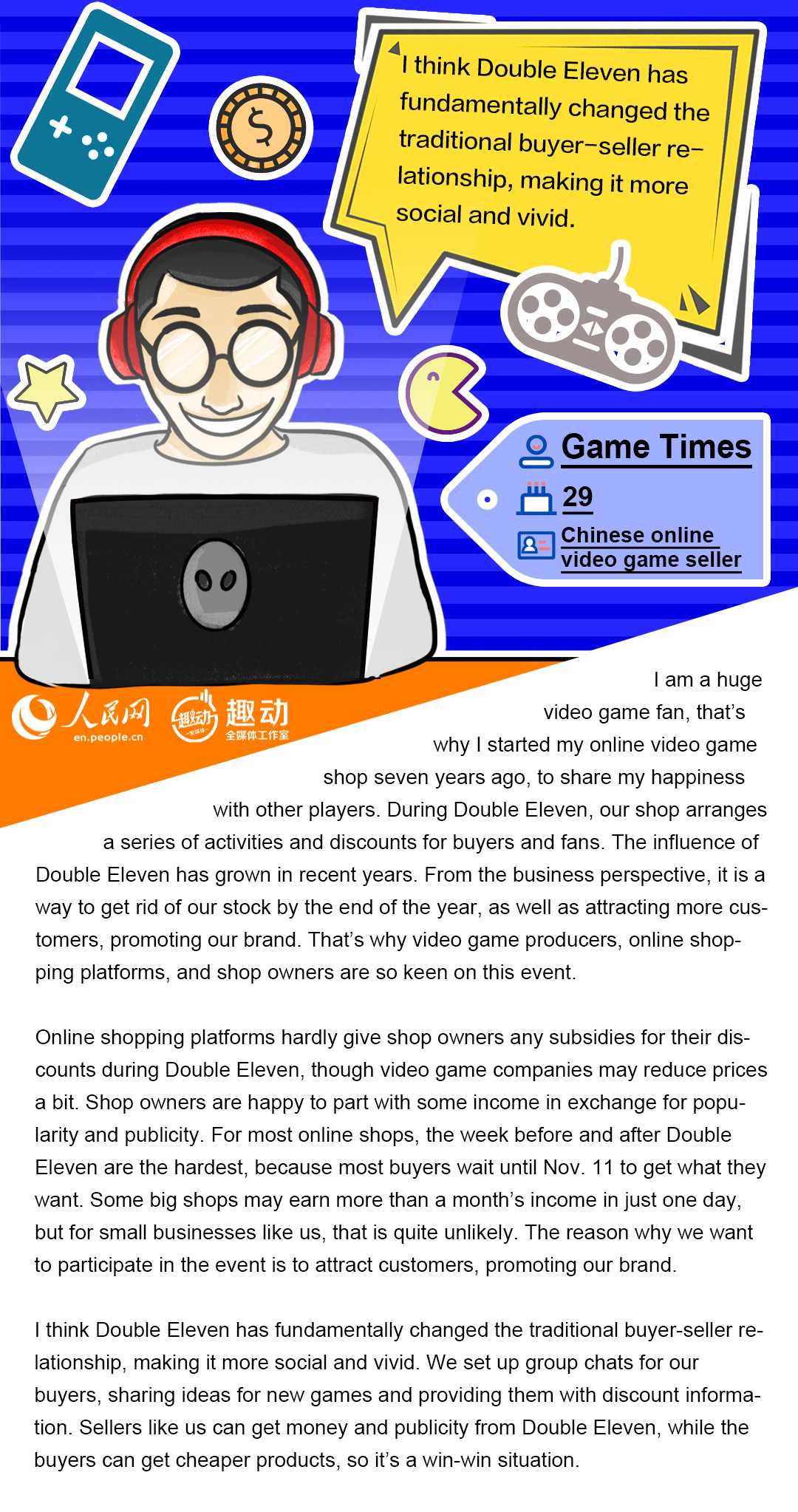
Game Times, 29
Beijing
Online video game seller, 7 years of online selling experience
I am a huge video game fan, that’s why I started my online video game shop seven years ago, to share my happiness with other players. During Double Eleven, our shop arranges a series of activities and discounts for buyers and fans. The influence of Double Eleven has grown in recent years. From the business perspective, it is a way to get rid of our stock by the end of the year, as well as attracting more customers, promoting our brand. That’s why video game producers, online shopping platforms, and shop owners are so keen on this event.
Online shopping platforms hardly give shop owners any subsidies for their discounts during Double Eleven, though video game companies may reduce prices a bit. Shop owners are happy to part with some income in exchange for popularity and publicity. For most online shops, the week before and after Double Eleven are the hardest, because most buyers wait until Nov. 11 to get what they want. Some big shops may earn more than a month’s income in just one day, but for small businesses like us, that is quite unlikely. The reason why we want to participate in the event is to attract customers, promoting our brand.
I think Double Eleven has fundamentally changed the traditional buyer-seller relationship, making it more social and vivid. We set up group chats for our buyers, sharing ideas for new games and providing them with discount information. Sellers like us can get money and publicity from Double Eleven, while the buyers can get cheaper products, so it’s a win-win situation.
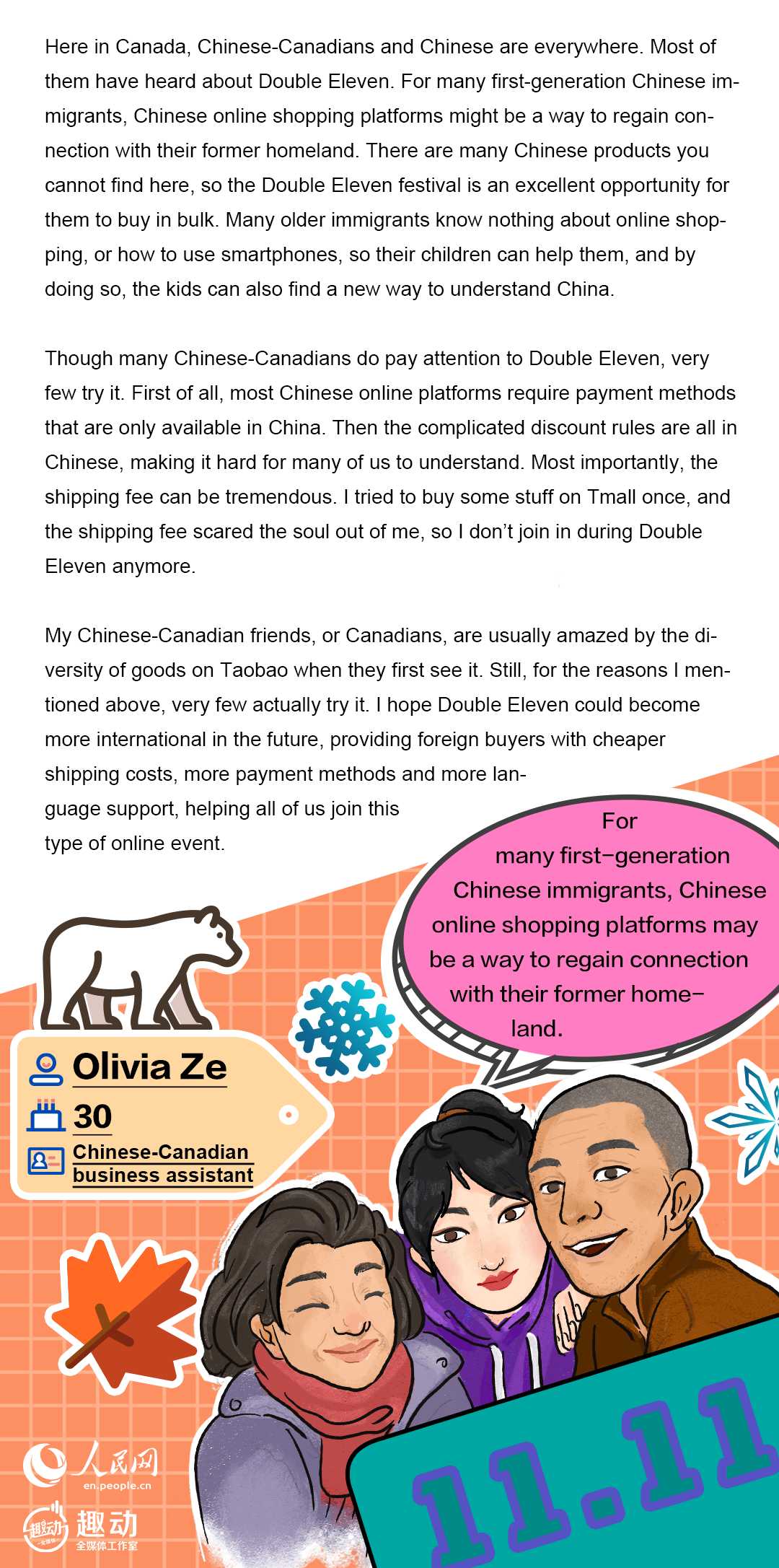
Olivia Ze, 30
Toronto
Business assistant, less enthusiastic about Double Eleven
Here in Canada, Chinese-Canadians and Chinese are everywhere. Most of them have heard about Double Eleven. For many first-generation Chinese immigrants, Chinese online shopping platforms might be a way to regain connection with their former homeland. There are many Chinese products you cannot find here, so the Double Eleven festival is an excellent opportunity for them to buy in bulk. Many older immigrants know nothing about online shopping, or how to use smartphones, so their children can help them, and by doing so, the kids can also find a new way to understand China.
Though many Chinese-Canadians do pay attention to Double Eleven, very few try it. First of all, most Chinese online platforms require payment methods that are only available in China. Then the complicated discount rules are all in Chinese, making it hard for many of us to understand. Most importantly, the shipping fee can be tremendous. I tried to buy some stuff on Tmall once, and the shipping fee scared the soul out of me, so I don’t join in during Double Eleven anymore.
My Chinese-Canadian friends, or Canadians, are usually amazed by the diversity of goods on Taobao when they first see it. Still, for the reasons I mentioned above, very few actually try it. I hope Double Eleven could become more international in the future, providing foreign buyers with cheaper shipping costs, more payment methods and more language support, helping all of us join this type of online event.
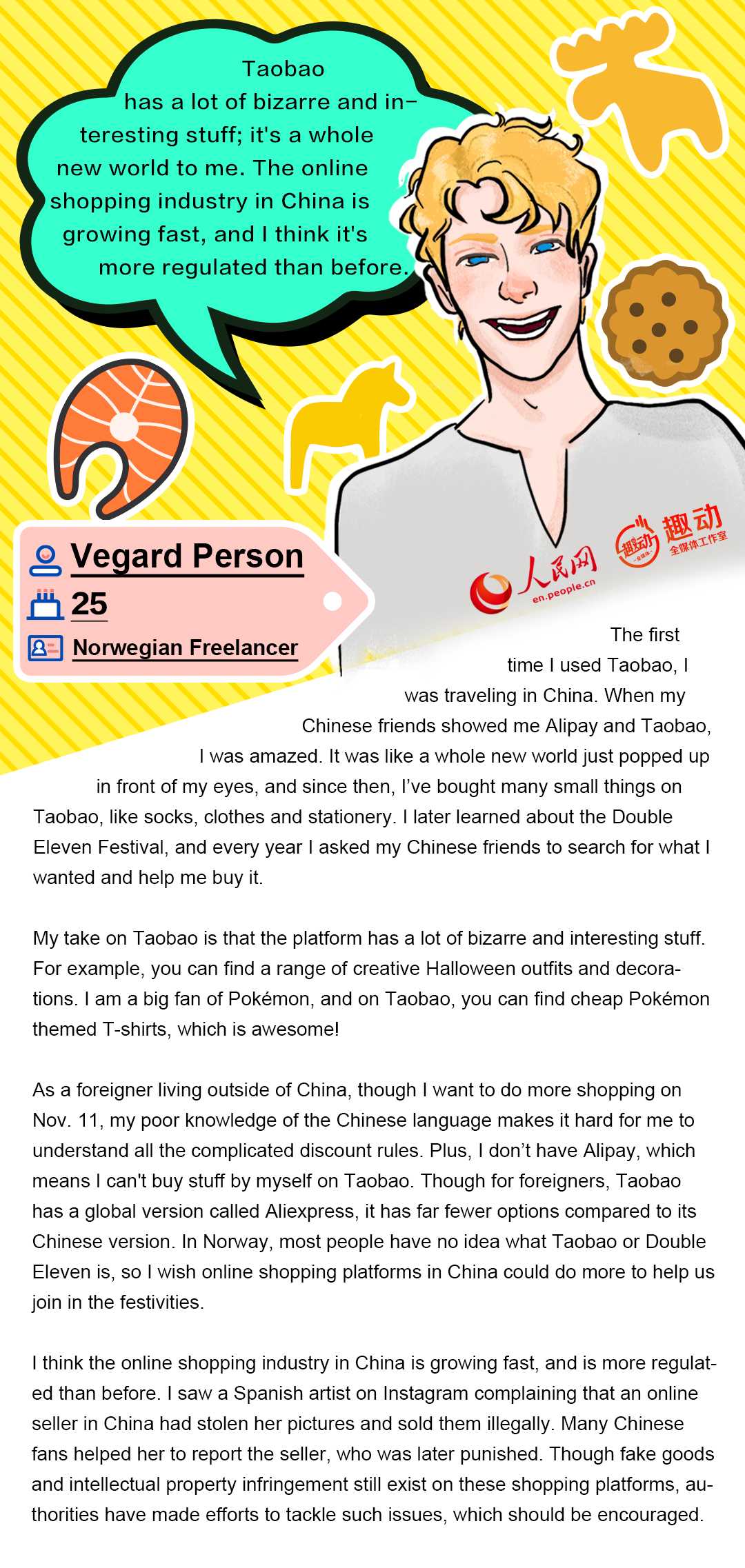
Vegard Person, 25
Oslo
Norwegian freelancer, Double Eleven fan and frequenter
Phrase: Taobao has a lot of bizarre and interesting stuff; it's a whole new world to me. The online shopping industry in China is growing fast, and I think it’s more regulated than before.
The first time I used Taobao, I was traveling in China. When my Chinese friends showed me Alipay and Taobao, I was amazed. It was like a whole new world just popped up in front of my eyes, and since then, I’ve bought many small things on Taobao, like socks, clothes and stationery. I later learned about the Double Eleven Festival, and every year I asked my Chinese friends to search for what I wanted and help me buy it.
My take on Taobao is that the platform has a lot of bizarre and interesting stuff. For ex-ample, you can find a range of creative Halloween outfits and decorations. I am a big fan of Pokémon, and on Taobao, you can find cheap Pokémon themed T-shirts, which is awesome!
As a foreigner living outside of China, though I want to do more shopping on Nov. 11, my poor knowledge of the Chinese language makes it hard for me to understand all the complicated discount rules. Plus, I don’t have Alipay, which means I can't buy stuff by myself on Taobao. Though for foreigners, Taobao has a global version called Aliexpress, it has far fewer options compared to its Chinese version. In Norway, most people have no idea what Taobao or Double Eleven is, so I wish online shopping platforms in China could do more to help us join in the festivities.
I think the online shopping industry in China is growing fast, and is more regulated than before. I saw a Spanish artist on Instagram complaining that an online seller in China had stolen her pictures and sold them illegally. Many Chinese fans helped her to report the seller, who was later punished. Though fake goods and intellectual property infringement still exist on these shopping platforms, authorities have made efforts to tackle such issues, which should be encouraged.

Morag Hobbs, 29
Beijing
British editor, Double Eleven rookie
As someone who uses online shopping platforms a lot in China, the Double Eleven Festival is a fun way to get items I've been thinking about for a while at a discounted price. A lot of people aimlessly buy during these shopping festivals, myself included, so I'm going to try and only buy stuff I've needed for a while and things for Christ-mas, as it's at the perfect time to buy presents!
I've never taken part in the Double Eleven Festival before, but I did take part in the 618 festival earlier this year, when I got loads of discounted summer clothes.
We have adopted Black Friday in the UK, but most people think it's a bit of a scam and don't bother too much with it. People tend to prefer shopping online via a laptop in the UK, rather than always using a phone as people do in China, so that changes consumer patterns. It means I'm much more impulsive with purchases in China as I can buy something as soon as I think about it via my phone, and have it delivered the next day. I think people use shopping festivals to buy household goods and beauty products like face masks for discounted prices here. In contrast, people in the UK tend to use shopping festivals to buy larger items like washing machines and other electronics.
Despite the convenience, there are some disadvantages of online shopping in China. The apps are only in Chinese, which doesn't bother me, but I know it's the reason some of my foreign friends don't use them. Also, sometimes I buy a specific brand and when it arrives I can tell it's fake. For this reason, I've started only buying brand-ed products from Tmall as it seems to be more strict with verified sellers.
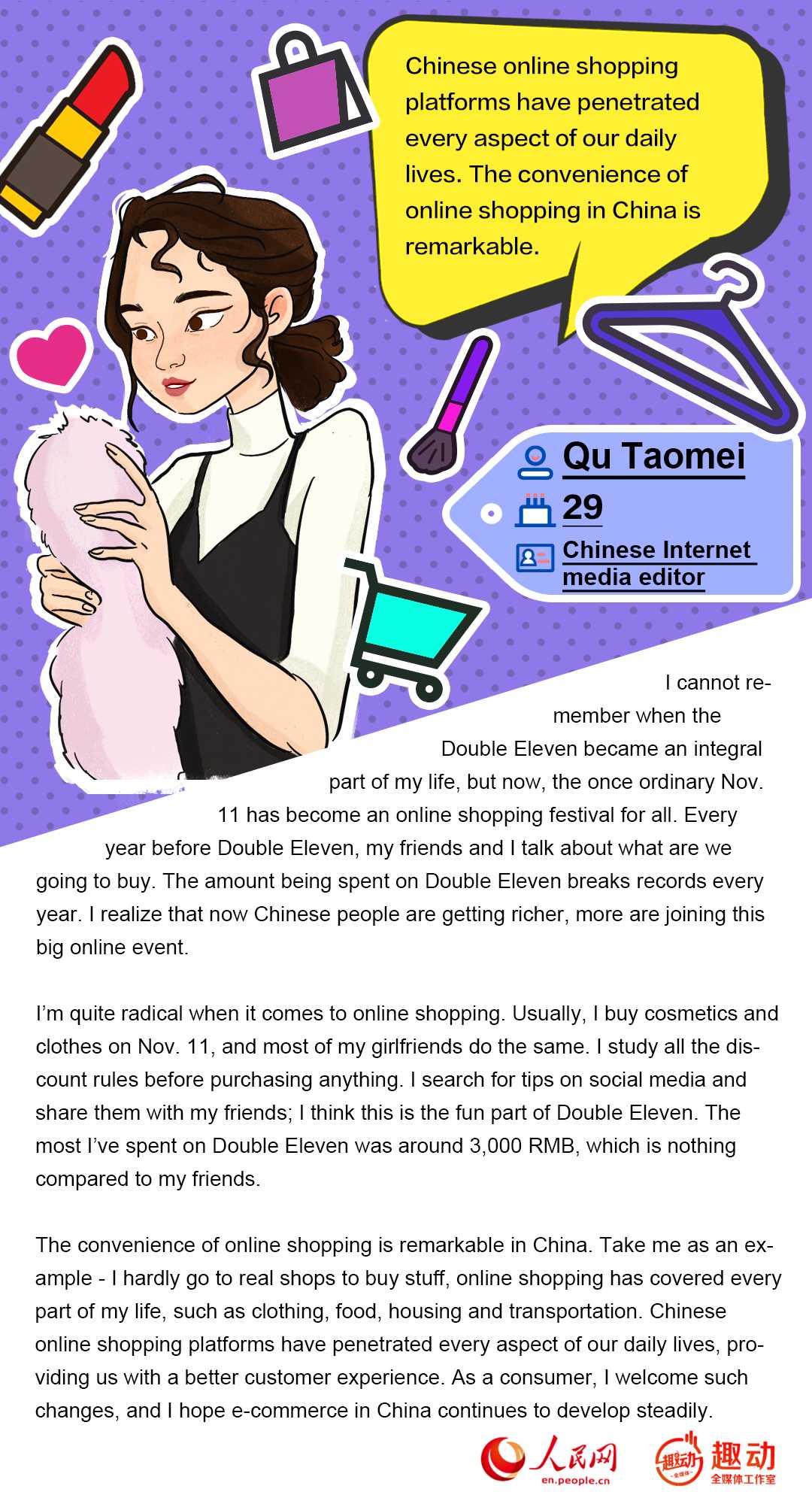
Qu Taomei, 29
Beijing
Online media editor, avid Double Eleven buyer
I cannot remember when the Double Eleven became an integral part of my life, but now, the once ordinary Nov. 11 has become an online shopping festival for all. Every year before Double Eleven, my friends and I talk about what are we going to buy. The amount being spent on Double Eleven breaks records every year. I realize that now Chinese people are getting richer, more are joining this big online event.
I’m quite radical when it comes to online shopping. Usually, I buy cosmetics and clothes on Nov. 11, and most of my girlfriends do the same. I study all the discount rules before purchasing anything. I search for tips on social media and share them with my friends; I think this is the fun part of Double Eleven. The most I’ve spent on Double Eleven was around 3,000 RMB, which is nothing compared to my friends.
The convenience of online shopping is remarkable in China. Take me as an example - I hardly go to real shops to buy stuff, online shopping has covered every part of my life, such as clothing, food, housing and transportation. Chinese online shopping platforms have penetrated every aspect of our daily lives, providing us with a better customer experience. As a consumer, I welcome such changes, and I hope e-commerce in China continues to develop steadily.
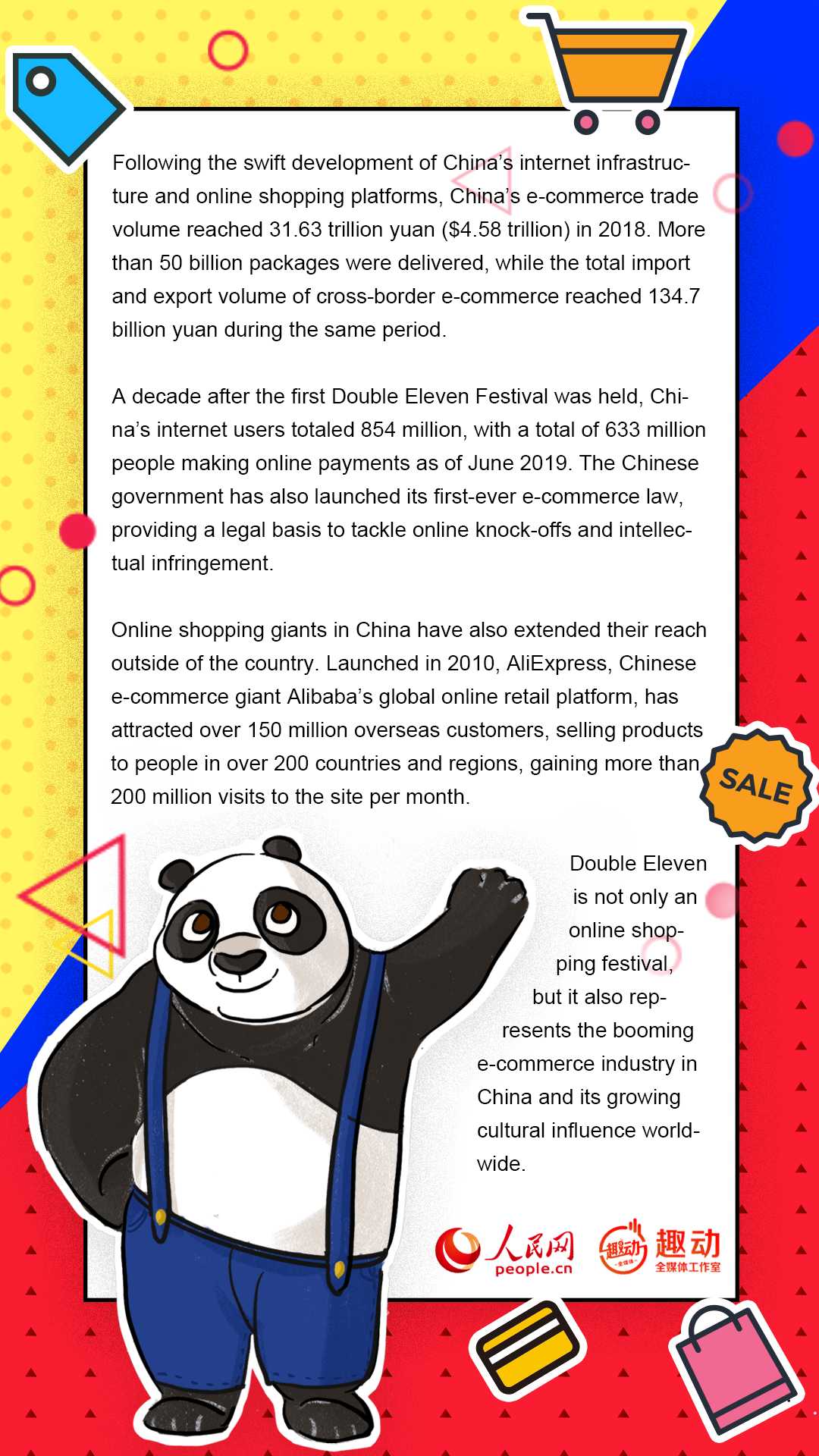
Following the swift development of China's internet infrastructure and online shopping platforms, China’s e-commerce trade volume reached 31.63 trillion yuan ($4.58 trillion) in 2018. More than 50 billion packages were delivered, while the total import and export volume of cross-border e-commerce reached 134.7 billion yuan during the same period.
A decade after the first Double Eleven Festival was held, China’s internet users totaled 854 million, with a total of 633 million people making online payments as of June 2019. The Chinese government has also launched its first-ever e-commerce law, providing a legal basis to tackle online knock-offs and intellectual infringement.
Online shopping giants in China have also extended their reach outside of the country. Launched in 2010, AliExpress, Chinese e-commerce giant Alibaba’s global online retail platform, has attracted over 150 million overseas customers, selling products to people in over 200 countries and regions, gaining more than 200 million visits to the site per month.

